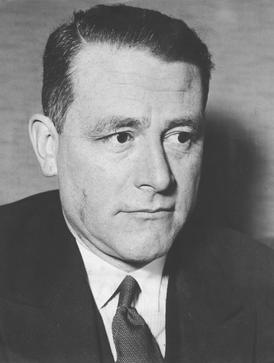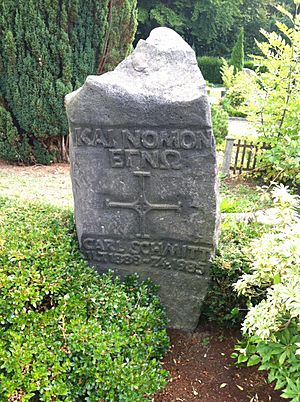Carl Schmitt facts for kids
Quick facts for kids
Carl Schmitt
|
|
|---|---|
 |
|
| Born | 11 July 1888 Plettenberg, Prussia, German Empire
|
| Died | 7 April 1985 (aged 96) Plettenberg, North Rhine-Westphalia, West Germany
|
| Other names | “Crown Jurist of the Third Reich” (Nickname) |
| Education | University of Berlin (1907) University of Munich (1908) University of Strasbourg (Dr. jur., 1910; Dr. habil., 1916) |
| Era | 20th-century philosophy |
| Region | Western philosophy |
| School | Continental philosophy Conservative Revolution Decisionism IR realism |
| Institutions | University of Greifswald (1921) University of Bonn (1921) Technische Universität München (1928) University of Cologne (1933) University of Berlin (1933–1945) |
|
Main interests
|
|
|
Notable ideas
|
|
|
Influenced
|
|
Carl Schmitt (born July 11, 1888 – died April 7, 1985) was a German jurist and political thinker. He was also a member of the Nazi Party. Schmitt wrote a lot about how political power is used.
He was a conservative thinker. He often criticized parliamentary democracy, liberalism, and cosmopolitanism. His ideas have greatly influenced modern political and legal thinking. However, his work is controversial because he supported and was involved with Nazism.
Many famous thinkers have studied Schmitt's work. These include Giorgio Agamben, Hannah Arendt, and Walter Benjamin. The Stanford Encyclopedia of Philosophy says that Schmitt was good at seeing the weaknesses of liberal systems. But it also states that his suggested solutions were "infinitely worse than the disease."
Contents
Carl Schmitt's Life Story
His Early Life and Studies
Carl Schmitt was born in Plettenberg, Germany. His family was Roman Catholic. His father was a small businessman. Schmitt studied law at universities in Berlin, Munich, and Strasbourg. He finished his studies in 1915. His first major paper in 1910 was about "Guilt and Types of Guilt."
In 1916, Schmitt joined the army. That same year, he completed another important paper. It was titled "The Value of the State and the Significance of the Individual." After this, he taught at several universities. These included the University of Greifswald and the University of Bonn.
His Marriages and Family
In 1916, Schmitt married Pavla Dorotić. She was a Croatian woman. They later divorced. Because the Catholic Church did not cancel their marriage, his second marriage in 1926 was not seen as valid by the Church. He married Duška Todorović, who was Serbian. Because of this second marriage, he was excommunicated from the Catholic Church.
Schmitt and Duška had a daughter named Anima. She later married Alfonso Otero Varela. He was a law professor in Spain. Anima translated some of her father's writings into Spanish.
Carl Schmitt passed away on April 7, 1985. He is buried in his hometown of Plettenberg.

His Religious Views
When he was young, Schmitt was a very dedicated Catholic. But he later distanced himself from the Church. Some scholars say his later work was not based on Catholic ideas. Instead, it explored political ideas in a different way.
In 1942, Schmitt met Mircea Eliade. Eliade was a Romanian historian of religion. Schmitt was interested in Eliade's work.
Working for the Nazis
Hitler's Rise to Power
On January 31, 1933, Adolf Hitler became Chancellor of Germany. Schmitt commented that this event marked a big change in German politics. He felt that the old way of governing was over.
The Nazis soon passed a law called the Enabling Act of 1933. This law allowed Hitler's government to make decisions without the President or Parliament. This gave Hitler a lot of power.
A politician named Alfred Hugenberg tried to stop the Nazis. He thought if he quit his job, the Enabling Act would no longer apply. But Carl Schmitt gave a legal opinion that stopped this plan. Schmitt said the "present government" meant the new kind of government Hitler had created. This helped the Nazis take full control.
His Role in the Nazi Party
Schmitt joined the Nazi Party on May 1, 1933. Soon after, he supported the burning of books by Jewish authors. He called for even more "un-German" books to be removed.
From June 1933, he was a leader in the Academy for German Law. He also became chairman of a committee for state law. In July, he was appointed to the Prussian State Council. In November, he became president of the Association of National Socialist German Jurists. He also became a professor at the University of Berlin. He held this job until World War II ended.
Schmitt used his ideas to support the Nazi dictatorship. He helped justify the idea of a "Führer state." This meant a state where one leader had all the power.
In June 1934, Schmitt became the editor of a Nazi newspaper for lawyers. In July, he wrote an article called "The Leader Protects the Law." In this article, he supported the political killings of the Night of the Long Knives. He said Hitler's authority was the "highest form of administrative justice."
Schmitt also presented himself as strongly antisemitic. In October 1936, he led a meeting of law teachers. There, he demanded that German law be "cleansed of the Jewish spirit." He also said that all books by Jewish scientists should be marked.
However, in December 1936, an SS newspaper accused Schmitt of being an opportunist. They said his antisemitism was fake. After this, Schmitt resigned from some of his positions. But he kept his professorship in Berlin. He continued to be investigated, but Hermann Göring stopped further actions against him.
During the German occupation of Paris, Schmitt met with French and German thinkers. These meetings took place at the Georges V Hotel.
After World War II
In 1945, American soldiers captured Schmitt. He spent over a year in a camp. After that, he went back to his hometown of Plettenberg. He never showed regret for his role in the Nazi state. He refused to go through "denazification," which meant he could not get academic jobs.
Even though he was isolated, he kept studying. He focused on international law. Many people visited him, including other scholars and young thinkers. These visitors included Ernst Jünger and Alexandre Kojève.
In 1962, Schmitt gave talks in Francoist Spain. Two of these talks led to his book Theory of the Partisan. In this book, he called the Spanish Civil War a "war of national liberation." He saw the partisan (a type of guerrilla fighter) as a new and important part of warfare.
Carl Schmitt's Influence
Schmitt's ideas are still important today. They are studied by thinkers on both the left and the right. His ideas include:
- The idea that state laws cannot fully limit what a country's leader (the sovereign) can do.
- The problem of a "state of exception." This is a situation where normal laws are suspended.
Schmitt also argued that political ideas often come from religious ones. This has influenced modern political theology. For example, the philosopher Jacob Taubes studied Schmitt's ideas on this topic.
Some scholars, like Herfried Münkler, call Schmitt a "classic of political thought." But Münkler also said Schmitt was "embittered, jealous, occasionally malicious" after the war. Waldemar Gurian called him the "Crown Jurist of the Third Reich."
Influence Around the World
Carl Schmitt's work has influenced many countries:
- Russia: His ideas have influenced Eurasianism in Russia. This philosophy offers a different way of thinking from liberal ideas.
- Chile: The 1980 Constitution of Chile was influenced by Schmitt's ideas. Jaime Guzmán, who worked with Augusto Pinochet, used Schmitt's concept of pouvoir constituant (power to create a constitution). This helped create a strong state with a free market economy.
- United States: Schmitt's work has influenced neoconservatism in the U.S. Some legal opinions during the Bush administration were similar to his ideas. These opinions justified actions during the War on Terror. For example, they discussed suspending legal protections and using surveillance. The number of legal references to Schmitt in the U.S. has greatly increased since 2000.
- China: Schmitt has become important in Chinese political thinking. This is especially true since Xi Jinping became leader in 2012. His ideas help justify the power of the Chinese Communist Party. Chinese scholars use Schmitt to find answers to modern issues. Some see his work as a way to challenge liberalism. Others think his theories can help China's development. There are different views on how closely his work is linked to fascism. Some scholars are careful about his arguments for state power. They worry about the danger of totalitarianism. But many agree that a strong state is needed for China's current changes.
Carl Schmitt's Writings
Many of Carl Schmitt's books and essays have been translated into English. Here are some of his most well-known works:
- The Concept of the Political (1932)
- Constitutional Theory (1928)
- The Crisis of Parliamentary Democracy (1923)
- Dictatorship (1921)
- Legality and Legitimacy (1932)
- The Nomos of the Earth (1950)
- Political Theology (1922)
- Theory of the Partisan (1963)
Images for kids
See also
 In Spanish: Carl Schmitt para niños
In Spanish: Carl Schmitt para niños
- Streitbare Demokratie
- German nationalism
 | Claudette Colvin |
 | Myrlie Evers-Williams |
 | Alberta Odell Jones |



